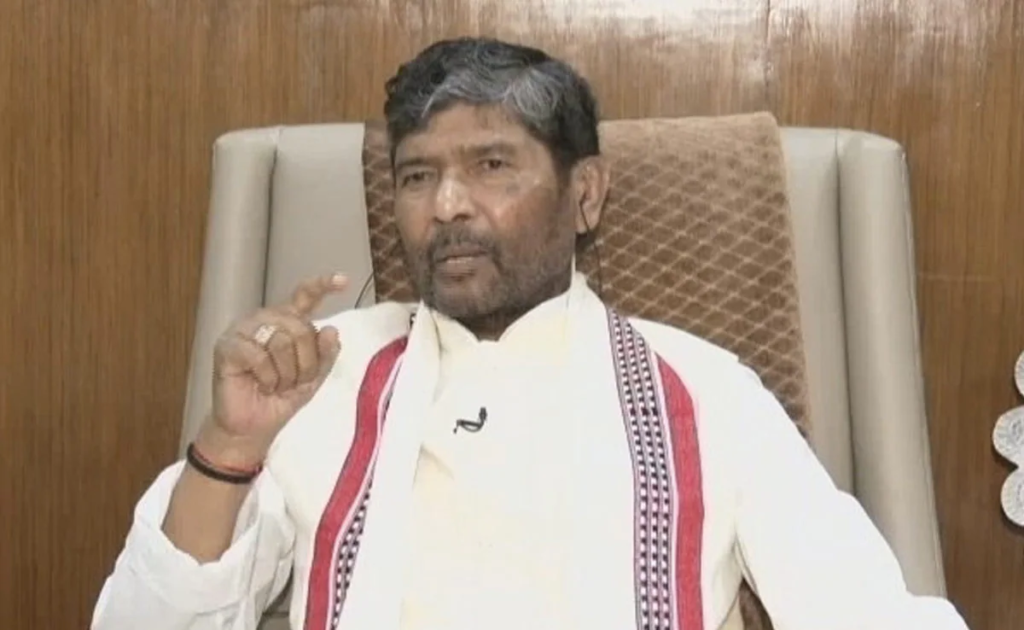Political Upheaval: The Great Union Minister
In a dramatic turn of events, Union Minister Pashupati Paras announced his resignation and withdrew his Rashtriya Lok Janshakti Party (RLJP) from the BJP-led national alliance. This decision, made public on a Tuesday morning, came swiftly after the Bharatiya Janata Party (BJP) confirmed a seat-sharing arrangement with the Lok Janshakti Party (LJP) led by Mr. Paras’ nephew, Chirag Paswan.

The BJP-LJP deal, forming part of a broader electoral understanding within Bihar for the upcoming Lok Sabha election, effectively sidelines Mr. Paras’ RLJP. Shockingly, the RLJP was allocated zero seats, while Chirag Paswan’s LJP secured five, including the coveted Hajipur constituency, previously won by Mr. Paras in the 2019 election.
Expressing his discontent with the alliance’s decision, Mr. Paras stated, “The NDA (National Democratic Alliance) deal has been announced. I am grateful to the Prime Minister (Narendra Modi). My party and I faced injustice. So I am resigning as minister.” His resignation underscores deep-seated grievances within the RLJP over being marginalized in the seat-sharing negotiations.
Amid speculation about potential alliances with opposition forces, including the state-level Congress-Rashtriya Janata Dal (RJD) coalition or the national-level INDIA bloc led by the Congress, Mr. Paras remained non-committal. However, he has unequivocally affirmed RLJP’s intent to contest the Hajipur seat, a stronghold previously held by him under the banner of the then-unified Lok Janshakti Party.
The RLJP’s genesis traces back to its association with the late Ram Vilas Paswan, the founder of LJP and a revered figure in Bihar’s political landscape. Ram Vilas Paswan, who served as a Union Minister and was the father of Chirag Paswan, led the LJP until his passing, following which internal factionalism and power struggles emerged within the party.
The rift within the Paswan family, exacerbated by Chirag Paswan’s ascent to leadership, has culminated in this political showdown. Chirag Paswan’s decision to chart an independent course for the LJP, separate from his uncle’s RLJP, underscores the shifting dynamics and personal ambitions shaping Bihar’s political arena.
The BJP’s calculated move to align with Chirag Paswan’s LJP reflects strategic considerations aimed at consolidating its electoral prospects in Bihar. By sidelining Mr. Paras’ RLJP, the BJP aims to tap into Chirag Paswan’s political capital and leverage his appeal among certain sections of the electorate.
However, the fallout from this alliance has wider implications, not only for the BJP-led coalition in Bihar but also for the broader contours of Indian politics. The resignation of a Union Minister and the split within a political family underscore the volatility and fluidity characterizing Indian electoral politics, where personal ambitions often intersect with larger ideological narratives.
The RLJP’s decision to contest the Hajipur seat independently signals a defiant stance against perceived injustices and a commitment to assert its political relevance. Mr. Paras’ resignation serves as a potent symbol of dissent within the NDA coalition, highlighting simmering tensions and discontentment among alliance partners.
As the political landscape in Bihar undergoes seismic shifts, the upcoming Lok Sabha election assumes heightened significance. The contest for supremacy in Bihar’s electoral battlegrounds is poised to intensify, with each party vying for dominance and seeking to capitalize on prevailing socio-political dynamics.
Moreover, the fallout from this episode may reverberate beyond Bihar, impacting the calculus of political alliances and coalition dynamics at the national level. The BJP’s maneuverings in Bihar are indicative of its broader strategy to consolidate power and expand its footprint across different regions of the country.
In conclusion, the resignation of Union Minister Pashupati Paras and the subsequent withdrawal of RLJP from the BJP-led alliance mark a significant development in Bihar’s political landscape. This episode underscores the intricate interplay of personal ambitions, factional rivalries, and strategic calculations that shape the trajectory of Indian politics. As Bihar braces for a fiercely contested electoral battle, the ramifications of this political upheaval are likely to reverberate far beyond the state’s borders, reshaping the contours of Indian politics in the process.

[…] Investigation-In response to a report from the US Border Patrol detailing the apprehension of a Lebanese migrant at the Texas border who claimed affiliation with a foreign terrorist […]